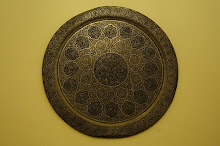 Review: In Arabian Nights: A Caravan of Moroccan Dreams
Review: In Arabian Nights: A Caravan of Moroccan DreamsBy Tahir Shah, 388 Pages. Bantam Books
Just over a year ago British travel writer Tahir Shah released his bestselling book The Caliph’s House in which he recounts a year spent with his family in a Casablanca shantytown renovating an old Moroccan estate attended to by a host of disruptive servants. In his latest travelogue, In Arabian Nights: A Caravan of Moroccan Dreams, Shah continues the story, but makes as his focus the timeless oral traditions of the North African kingdom.
Inspired by one of his servants who rebukes him for not really knowing Morocco and by his coffee-shop acquaintances who suggest that he ameliorate this situation by seeking out the raconteurs of Morocco’s traditional tales, Shah embarks on a personal quest to uncover and then unlock the heritage of storytelling that lies at the soul of Moroccan society and culture.
By following a string of mysterious leads, Shah ventures forth from his newly adopted Casablanca and into the Moroccan hinterland in search of wizened bards and their yarns, encountering a strange concoction of characters who help him in his quest to “find the story in his heart.” The author’s own upbringing in this same tradition of storytelling by way of his father, the late Afghan writer and savant, Idries Shah, infuses his quest with deeper meaning and provides a wider context to which the younger Shah places his discoveries.
The result is an interesting, if highly unusual, travelogue of interwoven narratives combining anecdote, personal reminiscences, cross-cultural observations, and traditional tales, whose warp and weft resemble the story within a story format of A Thousand and One Arabian Nights.
Unlike some other travel books which overload their readers with daring escapades, and expositions of the ultra-bizarre, In Arabian Nights avoids such obvious showmanship. Demonstrating that “real travel is not about the highlights with which you dazzle your friends once you’re home” Shah imbibes his readers, as though through osmosis, with the subtle but surreal nuances of life deep within the bosom of Morocco.
The inquisitive reader is rewarded with direct, almost voyeuristic, access into the complex human relationships and events unfolding behind the walls of Dar Khalifa or “The Caliph’s House” - the name of Shah’s renovated estate.
Here pitched battles unfold between Shah’s two female nannies vying for the attention of his children; his gardener mysteriously quits out of shame for having been caught staring at one of Shah’s female workers; and his entire staff of caretakers become obsessed with the possibility that Dar Khalifa is possessed by jinn - troublesome spirit-beings said to inhabit the recesses of abandoned places.
More central to Shah’s journey are his discoveries, made while trawling the souqs and medinas of Fes and Marrakesh, about the role of traditional storytelling in the Middle East as a method of passing down knowledge.
In contrast to the predominant view in the West that stories and tales exist at best only to entertain and stir the imaginations of children, Shah tells us that stories are seen in the East as being for everyone, embodying important truths and containing narrative patterns designed to nurture wisdom and cultivate the human mind. Drawing upon the verbiage of the Sufi tradition of which his father was a part, Shah asserts that such stories act as “a kind of key, a catalyst, a device to help humanity think in a certain way, to help us wake up from the sleep” in which humankind finds itself.
This same oral storytelling tradition, Shah tells us, has entirely disappeared in the West. This is largely owing to what the author claims is our current obsession with book learning. It is a particularly poignant indictment. Believing that knowledge and wisdom come only with volume, the people of the western world, he tells us, simply read too many books, and are constantly demanding new material. “Much of the time it’s the same old stuff packaged in a fresh way” Shah says. “The result is wordage for the sake of wordage.” This is in contrast, the author claims, to the situation in the East, whose denizens value the same narratives that have been in circulation for millennia and which have been “tried and tested” as vessels of knowledge.
In Arabian Nights reads like a fairy tale, moving between moments of sobering reality and a surrealism generated from an unusual mix of dream sequences, fictional storytelling, and metaphysics. There is little here for those readers seeking the outlandish characters and drug-induced exploits of the expatriate Morocco of Paul Bowles and William Burroughs, although Shah does throw in one such character for good measure -- an eccentric Italian book collector in Tangier obsessed with phalluses and who sells Shah the complete first edition of Burton’s translation of The Arabian Nights.
Shah’s chronicle at first appears puerile and the tales which he collects and recounts, sometimes in succession, come across as slightly overwhelming and oppressive. But as the author implies throughout the book, this reaction stems from our rejection of such modes of communication inculcated by a culture bereft of the knowledge of what a story can actually do.
Although Shah does not explicitly reveal what these stories in fact do to those who read them, by the end of the book the yarns have somehow seeped into you.
All text in this post copyright John Zada and John Bell 2008













No comments:
Post a Comment